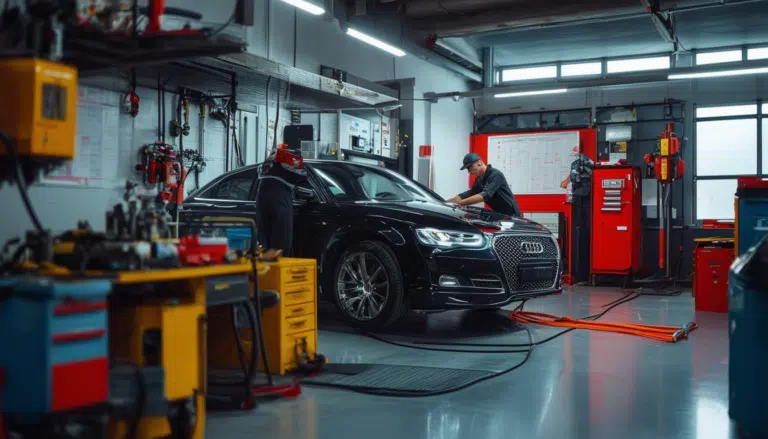Fuel efficiency is essential for the sustainability and profitability of vehicle fleets. Implementing proper maintenance practices not only optimizes fuel consumption but also prolongs the lifespan of vehicles. From performing regular oil changes to checking the pressure of tires, every detail matters. Preventive maintenance becomes an essential tool to minimize operating costs and contribute to the care of the environment. By knowing the best practices and techniques, more efficient and safer operation of automobiles can be achieved, benefiting both owners and the environment in which they operate.
Fuel efficiency is a vital aspect of vehicle performance and fleet management. Implementing proper maintenance practices not only helps to reduce operating costs but also contributes to sustainability and environmental care. Below, various strategies are detailed to facilitate maximizing fuel efficiency through effective maintenance.
Regular maintenance of the fuel system
The heart of any vehicle is its fuel system. Regular maintenance includes cleaning and replacing fuel filters, as well as checking the fuel pump. Keeping these components in optimal condition ensures a steady delivery of fuel to the engine, resulting in better performance and reduced consumption.
Adjustments in the transmission system
The transmission is crucial in maintaining fuel efficiency. Adjusting the calibration of the transmission and ensuring there are no leaks can significantly impact fuel efficiency. A properly functioning transmission mechanism allows for smooth gear shifting and, as a result, less resistance to movement.
Influence of tires on fuel consumption
The pressure of tires plays an essential role in fuel economy. Ensuring that the tires are inflated to the recommended pressure will prevent an increase in rolling resistance. Additionally, it is important to rotate and align the tires regularly to extend their lifespan and improve fuel efficiency.
Maintenance of the engine and its components
The engine is another aspect that requires regular care. Performing regular oil changes, as well as checking and maintaining spark plugs, can significantly increase fuel efficiency. A well-maintained engine not only consumes less fuel but also reduces harmful emissions.
Inspections of the exhaust system
The exhaust system should be inspected for obstructions or damage. An efficient exhaust system allows combustion gases to flow freely, which optimizes engine performance. This not only improves fuel efficiency but also contributes to quieter operation and greater vehicle durability.
Inspection of electrical systems
The condition of electrical systems and the proper use of accessories such as air conditioning can influence fuel consumption. It is essential to check the condition of the battery and alternator, as well as to avoid excessive use of electrical components that may overload the system and thus affect engine efficiency.
Driver training in efficient driving practices
Driver training is beneficial for maximizing fuel efficiency. Teaching drivers about the importance of efficient driving and how to adopt more sustainable driving habits can result in significant savings. Promoting the use of techniques such as gentle acceleration and avoiding hard braking contributes to lower fuel consumption.
Implementation of monitoring technology
Utilizing monitoring technology to track fuel performance in real-time allows companies and vehicle owners to identify areas that require immediate attention. These tools can provide valuable insights into driving habits, vehicle conditions, and other factors that may affect efficiency.
Conducting comprehensive and regular maintenance is key to maximizing fuel efficiency. Adopting good practices not only reduces costs but also contributes to environmental well-being. For more information about the relationship between maintenance and fuel efficiency, you can consult this detailed guide.
The proper maintenance of vehicles is a fundamental strategy to ensure fuel efficiency. A good maintenance routine not only translates to lower operating expenses but also contributes to environmental sustainability. To achieve this, it is essential to conduct periodic inspections that include oil changes, filter checks, and tire condition assessments.
Air and fuel filters play a crucial role in engine performance. A clogged filter can limit airflow, affecting combustion and increasing fuel consumption. Therefore, ensuring these components are always clean can significantly improve engine efficiency.
Moreover, the proper tire pressure is vital. Under-inflated tires are not only less safe but also increase rolling resistance, which raises fuel costs. Regularly checking tire pressure and keeping them inflated to recommended levels is a practice that saves money and enhances fuel efficiency.
Another aspect to consider is driver training. Efficient driving, which includes techniques such as gradual acceleration and anticipating stops, can significantly reduce fuel consumption. Therefore, investing in employee training can lead to substantial savings for companies operating vehicle fleets.
Finally, implementing regular preventive maintenance and following proper practices will not only extend the lifespan of vehicles but also help minimize the environmental impact related to fuel consumption. Leveraging these best practices is essential for any vehicle owner looking to optimize costs and improve their energy efficiency.




